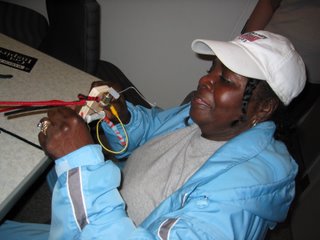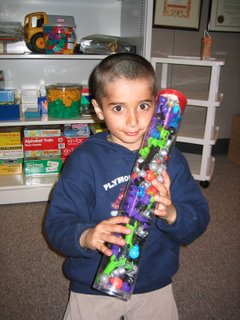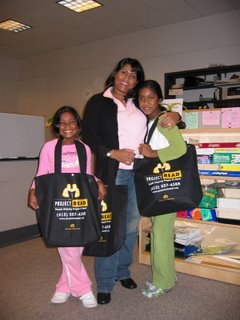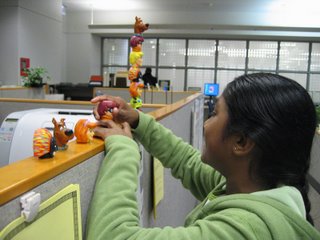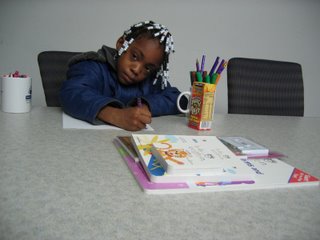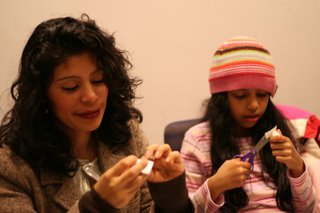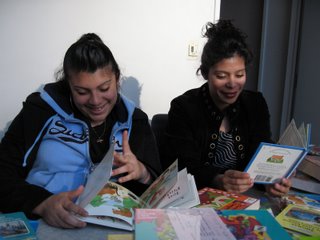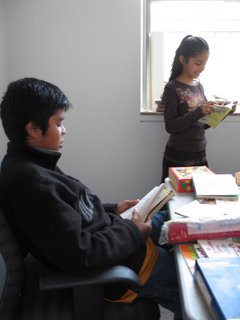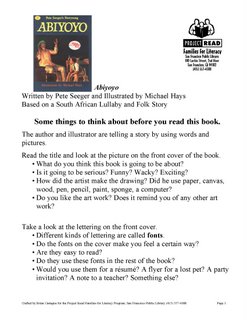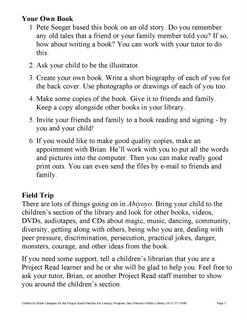Monday, May 22, 2006
Sunday, May 21, 2006
Families Program Tutor Training
Here is the text from the families program component of our tutor training.
Families for Literacy at Project Read
Families for Literacy
Families for Literacy is a special part of Project Read which gives extra support to adult learners who provide care to young children.
Why have family literacy at an adult program?
Many adult learners list family oriented goals as key priorities in their lives. We assist parents/caregivers in their crucial role as a child’s first and foremost teacher by offering a broad selection of free books, study guides, monthly workshops, and other services to promote reading and learning as a natural part of family life.
Adult and Family Literacy
Project Read believes that when a parent/caregiver improve his own literacy skills, it provides many benefits to the other family members and society as a whole. When a parent models learning activities, she teaches her child by example to value education and personal growth. The parent can better support her children with schoolwork and communicate more effectively with teachers and school administrators. The increased literacy skills and self-confidence can help parents be more communicative and effective at home, work, and in the community.
Welcome families to the public library.
We offer an alternative entry point and supportive environment where families who may otherwise feel intimidated by a public library will instead experience a sense of connection and develop an ever-increasing interest in their public library and other community resources.
Family Workshops
We invite families into the Project Read office on a regular basis to have delicious and nutritious food, choose free books, use the computer lab, and engage in various literacy activities. We encourage children and parents to share common tasks as well as pursue their individual needs and interests while developing positive relationships with library staff, other children, and adult learners. We work with community partners such as the Exploratorium® and the University of California to present highly interactive and thoroughly engaging workshops on science literacy, healthy nutrition, and much more.
FREE children’s books
We offer a wide range of books and learning materials to all Families for Literacy learners and family members who participate. We actively engage these participants in selecting their own books. By doing so, we help our learners build a rich, diverse, and multi-generational home library. We hope these books and our support services help foster an environment where sharing books and engaging in learning activities are a natural part of family life.
What’s a tutor to do?
There are simple things parents can do to improve their own literacy abilities while helping their children develop the skills and knowledge to be happy and successful at home, school, and in the community. Here are some ways a tutor can help.
· Encourage your learner to regularly engage in reading and learning activities in the home.
· Make sure that your learner knows that, no matter what his current reading ability or the age of a child, there are simple and enjoyable ways to help a child develop oral language, pre-literacy, and reading skills. He can tell a child stories, sing songs, take walks and point out things, chit-chat and engage in conversations, look at the pictures in books and discuss them and tell his own stories. Activities like these can help a child develop vocabulary, express herself, communicate with others, make sense of the world around, recognize the connections between words and objects, have positive feelings associated with books and learning, and be prepared for the academic and social aspects of school– and beyond. It is also a fun way to spend time with a child.
· Check in with Project Read staff to select books to enhance, or establish, the learner’s home collection. Help your learner take advantage of this opportunity to receive brand new books to build an engaging, diverse, and multi-generational home library.
· Have a chat about some children books that you, or a child in your life, enjoyed when approximately the same age as your learner’s child. Get copies of the book from us or borrow them from the library. Practice until your learner is comfortable reading them aloud.
· Focus on one book and stay with it until your learner knows it really well. Encourage your learner to make reading that book a family ritual.
· Encourage your learner to use the pictures in books to tell stories. She can tell the story in her own words. Perhaps it could become an exciting and creative tradition of telling the story differently each time.
· Encourage your learner to borrow children’s videos, DVDs, CDs, and audio cassettes from Project Read. We have a large selection of literature based multi-media material. Some of the media is packaged with companion books and other materials with related themes. Ask us about strategies to use TV and other media as learning tools.
· Do a language experience story geared toward the learner’s child. It could be the story of a family event, an experience from when the learner was his child’s age, a story told to the learner when a child, or a story from a book that was read to the learner as a child. You could even use a scene or the plot from a movie, TV show, or radio broadcast that your learner has fond memories of.
· Encourage your learner to tell stories to her child at bedtime and have the child tell stories to her. Help your learner write down some of the stories they tell. Enter the text into the computer and possibly draw pictures or use clip art to illustrate. Perhaps ask the child to illustrate the typed story.
· Use the Project Read Computer Learning Lab to copy and paste the text of a children’s book into Read Please. Make listening to it and following along a part of your session. It will increase your learner’s confidence and ability to read the book to his child while increasing his comfort with computers and technology.
· Read some comics together. Reading and discussing comics can be an engaging, challenging, and rewarding activity for tutoring sessions. Get a daily paper and go through the comics section together. Pick a few that your learner likes and read them together on a regular basis. Make sure at least one is good to share with the learner’s child. Sharing comics can be a fun and low-stress family reading activity that creates an environment where enjoying the newspaper is a natural part of home life. Also: check out our FFL book larder’s large selection of comic collections and view comics online through the links on our Computer Lab Home Page or at comics.com, ucomics.com, dailyink.com, sfgate.com, and other sites.
· Ask for some of our FFL study guide packets. They are jam-packed with information and activities to easily explore specific children’s books (like Where the Wild Things Are and Abiyoyo). You can apply many of the questions and strategies to explore just about any book.
· Take your learner on a tour of the children’s section of the library. Show where the various books and multi-media materials are stored. Get to know the children’s department staff.
· Encourage your learner to have his/her family participate in the Project Read Families for Literacy summer book club. It has a very flexible structure and can connect folks to books in meaningful ways.
The bottom line
When you help a parent/caregiver develop greater comfort with reading, discussing, and sharing books – he/she gains stronger literacy, critical thinking, and communication skills. These changes can have a profound positive impact in the home and throughout our community.
KQED Presentation May 2006: Putting it All Together
We all have different programs, families, facilities, staff, resources, challenges, etc. Here are some of the things we did to integrate HOL into our program. You are welcome to have and use any materials we have created - but the main reason we’re showing them to you is to get you thinking of how you can create similar, different, and even spiffier things that fit your program.
Some of what Project Read needs to factor in:
· Adult Literacy Program.
· Learner centered program - sets own literacy goals.
· Our primary family literacy focus is the caregiver.
· Limited number of families.
· Limited contact with children.
· One-to-one relationship with tutor is primary method to deliver services.
· A service of the SF Public Library.
· Monthly family workshops have wide range of ages – don’t always reach target group of under 5.
· Must accomplish FFL goals of CA State Library + report back to them ½ yearly.
· Need/desire to include different learning models and utilize multiple approaches and methods to deliver service.
· Family program impact, positive and negative, on adult program. To what degree does it distract from our core mission? Staff time, resources, storage, use of space? Does having the families in the office/lab discourage some adult learners from using the space?
· Address long and short term needs and objectives.
· Try to view things as work in progress – doesn’t have to be perfect, we can try things out and keep adjusting.
A few ways/systems we established to naturally weave HOL concepts into our program/culture.
· Integrated HOL methodology into our FFL handouts / activity sheets.
· Utilize the ideas in context. When comes up in one-to-one encounters, our workshops, professional meetings, etc.
· Included concepts in our summer book club.
· Established literature based, multi-media lending library.
· Give out free audio, video, and computer materials.
· Added concepts to tutor training. Revised recently to include information from Tracey and Sheila’s Oral Language workshop.
· Added some software that connects to literature and PBS (I Spy, Chato’s Kitchen, Why Mosquito’s Buzz, Clifford, Arthur, etc.).
· Added KQED Education link to web site.
We all have different programs, families, facilities, staff, resources, challenges, etc. Here are some of the things we did to integrate HOL into our program. You are welcome to have and use any materials we have created - but the main reason we’re showing them to you is to get you thinking of how you can create similar, different, and even spiffier things that fit your program.
Some of what Project Read needs to factor in:
· Adult Literacy Program.
· Learner centered program - sets own literacy goals.
· Our primary family literacy focus is the caregiver.
· Limited number of families.
· Limited contact with children.
· One-to-one relationship with tutor is primary method to deliver services.
· A service of the SF Public Library.
· Monthly family workshops have wide range of ages – don’t always reach target group of under 5.
· Must accomplish FFL goals of CA State Library + report back to them ½ yearly.
· Need/desire to include different learning models and utilize multiple approaches and methods to deliver service.
· Family program impact, positive and negative, on adult program. To what degree does it distract from our core mission? Staff time, resources, storage, use of space? Does having the families in the office/lab discourage some adult learners from using the space?
· Address long and short term needs and objectives.
· Try to view things as work in progress – doesn’t have to be perfect, we can try things out and keep adjusting.
A few ways/systems we established to naturally weave HOL concepts into our program/culture.
· Integrated HOL methodology into our FFL handouts / activity sheets.
· Utilize the ideas in context. When comes up in one-to-one encounters, our workshops, professional meetings, etc.
· Included concepts in our summer book club.
· Established literature based, multi-media lending library.
· Give out free audio, video, and computer materials.
· Added concepts to tutor training. Revised recently to include information from Tracey and Sheila’s Oral Language workshop.
· Added some software that connects to literature and PBS (I Spy, Chato’s Kitchen, Why Mosquito’s Buzz, Clifford, Arthur, etc.).
· Added KQED Education link to web site.








